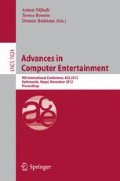Abstract
Social network games in Facebook are played by millions of players on daily basis. Due to their design characteristics, new challenges for game design and playability evaluations arise. We present a study where 18 novice inspectors evaluated a social game using playability heuristics. The objective is to explore possible domain-specific playability problems and to examine how the established heuristics suit for evaluating social games. The results from this study show that some implementations of the social games design characteristics can cause playability problems and that the established heuristics are suitable for evaluating social games. The study also revealed that inspectors had problems in interpreting cause and effect of the found problems.
Access this chapter
Tax calculation will be finalised at checkout
Purchases are for personal use only
Preview
Unable to display preview. Download preview PDF.
References
Baraf, E.: From Two Years to Two Months: Transforming a Studio. Gamasutra Online Magazine (2010), http://www.gamasutra.com/view/feature/4324/from_two_years_to_two_months_.php
Bogost, I.: Cow Clicker: The Making of Obsession (2010), http://www.bogost.com/blog/cow_clicker_1.shtml
Desurvire, H., Caplan, M., Toth, J.: Using Heuristics to Improve the Playability of Games. In: CHI Conference, Vienna, Austria (April 2004)
Desurvire, H., Wiberg, C.: Game Usability Heuristics (PLAY) for Evaluating and Designing Better Games: The Next Iteration. In: Ozok, A.A., Zaphiris, P. (eds.) OCSC 2009. LNCS, vol. 5621, pp. 557–566. Springer, Heidelberg (2009)
Hertzum, M., Jacobsen, N.E.: The Evaluator Effect: A Chilling Fact About Usability Evaluation Methods. International Journal of Human Computer Interaction 13(4), 421–443 (2001)
Järvinen, A.: Game Design for Social Networks: Interaction Design for Playful Dispositions. In: Sandbox 2009, pp. 95–102. ACM Press (2009)
Kallio, K.P., Mäyrä, F., Kaipainen, K.: At Least Nine Ways to Play: Approaching Gamer Mentalities. Games and Culture 6(4), 327–353 (2011)
Koivisto, E.M.I., Korhonen, H.: Mobile Game Playability Heuristics (2006), www.forum.nokia.com
Korhonen, H.: Comparison of Playtesting and Expert Review Methods in Mobile Game Evaluation. In: Fun and Games 2010 Conference, pp. 18–27. ACM Press (2010)
Korhonen, H.: The Explanatory Power of Playability Heuristics. In: ACE 2011. ACM Press (2011), article no. 40
Korhonen, H., Koivisto, E.M.I.: Playability Heuristics for Mobile Game. In: MobileHCI, pp. 9–16. ACM Press (2006)
Korhonen, H., Koivisto, E.M.I.: Playability Heuristics for Mobile Multi-player Games. In: DIMEA, pp. 28–35. ACM Press (2007)
Kuchera, B.: SimCity Social is a collection of dirty tricks pretending to be game play. The Penny Arcade Report (2012), http://penny-arcade.com/report/editorial-article/simcity-social-is-a-collection-of-dirty-tricks-pretending-to-be-game-play.php
Kultima, A.: Casual Game Design Values. In: Proceedings of the 13th International MindTrek Conference: Everyday Life in the Ubiquitous Era. ACM, Tampere (2009), http://doi.acm.org/10.1145/1621841.1621854
Ling, C., Salvendy, G.: Effect of Evaluators’ Cognitive Style on Heuristic Evaluation: Field Dependent and Field Independent Evaluators. International Journal of Human-Computer Studies 67(4), 382–393 (2009)
Luban, P.: The Design of Free-To-Play Games: Part 1. Gamasutra Online Magazine (2010), http://www.gamasutra.com/view/feature/6552/the_design_of_freetoplay_games_.php?print=1
Paavilainen, J., Korhonen, H., Saarenpää, H.: Comparing Two Playability Heuristic Sets with Expert Review Method: A Case Study of Mobile Game Evaluation. In: Lugmayr, A., et al. (eds.) Media in the Ubiquitous Era: Ambient, Social and Gaming Media, pp. 29–52. IGI Global (2011)
Paavilainen, J.: Critical Review on Video Game Evaluation Heuristics: Social Games Perspective. In: FuturePlay 2010, pp. 56–65. ACM (2010)
Palmer, D.E.: Pop-Ups, Cookies, and Spam: Toward a Deeper Analysis of the Ethical Significance of Internet Marketing Practices. Journal of Business Ethics 58, 271–280 (2005)
Pinelle, D., Wong, N., Stach, T.: Heuristic Evaluation for Games: Usability Principles for Video Game Design. In: CHI 2008, pp. 1453–1462 (2008)
Pinelle, D., Wong, N., Stach, T., Gutwin, C.: Usability Heuristics for Networked Multiplayer Games. In: GROUP 2009, pp. 169–178 (2009)
Schaffer, N.: Heuristic Evaluation of Games. In: Isbister, K., Schaffer, N. (eds.) Game Usability: Advice from the Experts for Advancing the Player Experience, pp. 79–89. Morgan Kaufmann (2008)
Sheffield, B.: Gamelab 2011: MUD Creator Bartle: ’Current Social Games Are Not Fun’. Gamasutra Online Magazine (2011), http://www.gamasutra.com/view/news/35551/Gamelab_2011_MUD_Creator_Bartle_Current_Social_Games_Are_Not_Fun.php
Steinberg, S.: Social Games: 5 Growing Threats to Watch, Industry Gamers Exclusive (2011), http://www.industrygamers.com/news/social-games-5-growing-threats-to-watch
Tyni, H., Sotamaa, O., Toivonen, S.: Howdy Pardner!: On Free-to-play, Sociability and Rhythm Design in FrontierVille. In: MindTrek 2011. ACM Press (2011)
van Meurs, R.L.M.: And Then You Wait: The Issue of Dead Time in Social Network Games. In: DIGRA 2011 (2011)
Ventrice, T.: Building the Foundation of a Social Future (2009), http://www.gamasutra.com/view/feature/4210/building_the_foundation_of_a_.php
Author information
Authors and Affiliations
Editor information
Editors and Affiliations
Rights and permissions
Copyright information
© 2012 Springer-Verlag Berlin Heidelberg
About this paper
Cite this paper
Paavilainen, J., Alha, K., Korhonen, H. (2012). Exploring Playability of Social Network Games. In: Nijholt, A., Romão, T., Reidsma, D. (eds) Advances in Computer Entertainment. ACE 2012. Lecture Notes in Computer Science, vol 7624. Springer, Berlin, Heidelberg. https://doi.org/10.1007/978-3-642-34292-9_24
Download citation
DOI: https://doi.org/10.1007/978-3-642-34292-9_24
Publisher Name: Springer, Berlin, Heidelberg
Print ISBN: 978-3-642-34291-2
Online ISBN: 978-3-642-34292-9
eBook Packages: Computer ScienceComputer Science (R0)

